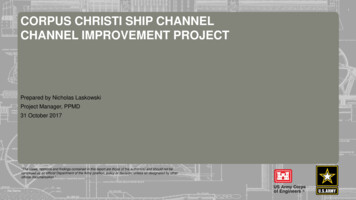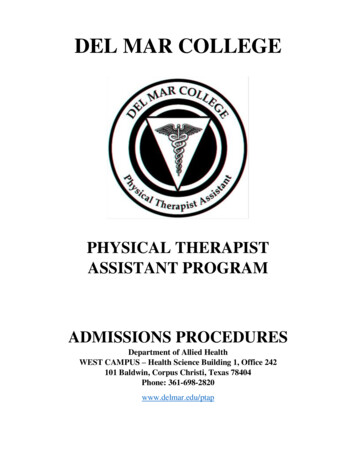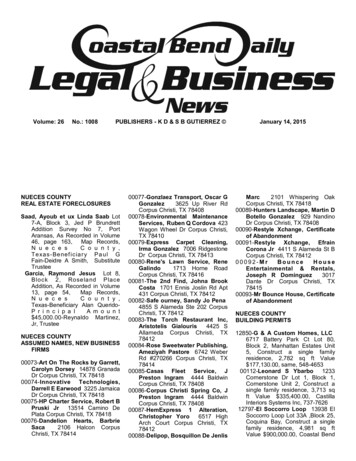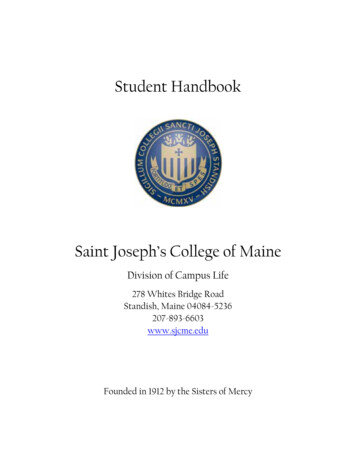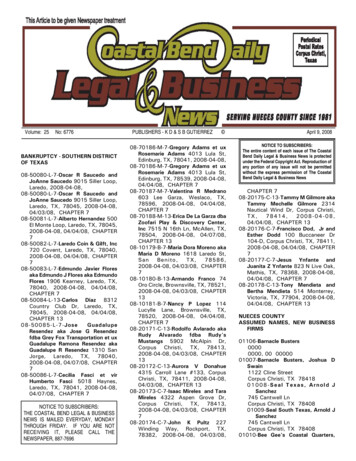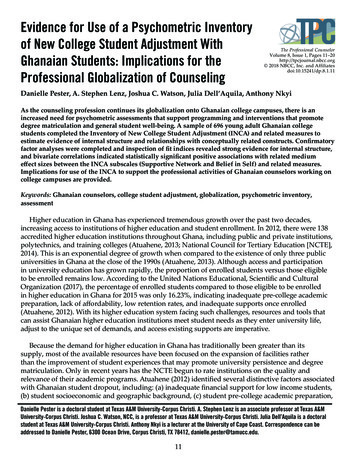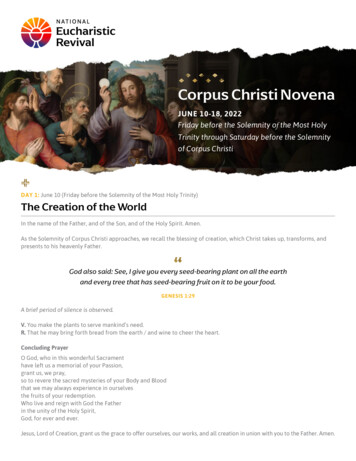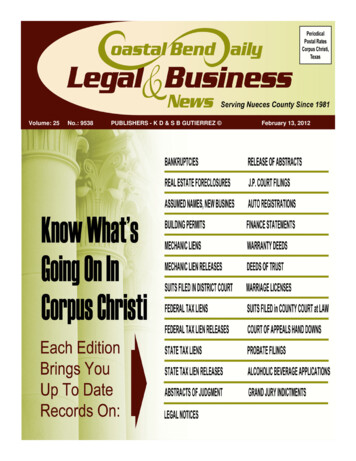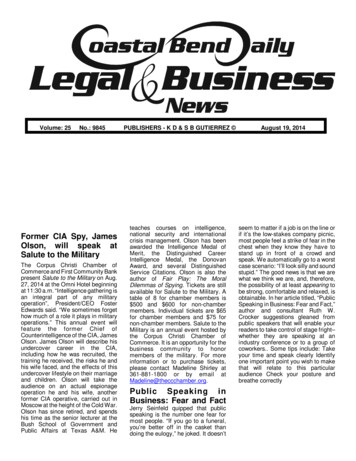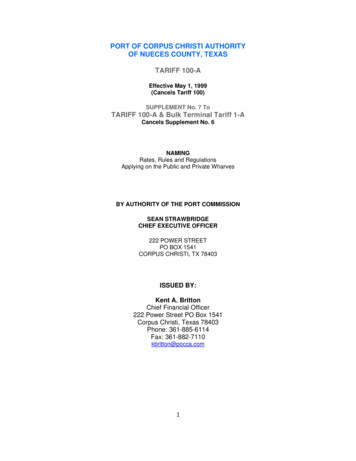
Transcription
PORT OF CORPUS CHRISTI AUTHORITYOF NUECES COUNTY, TEXASTARIFF 100-AEffective May 1, 1999(Cancels Tariff 100)SUPPLEMENT No. 7 ToTARIFF 100-A & Bulk Terminal Tariff 1-ACancels Supplement No. 6NAMINGRates, Rules and RegulationsApplying on the Public and Private WharvesBY AUTHORITY OF THE PORT COMMISSIONSEAN STRAWBRIDGECHIEF EXECUTIVE OFFICER222 POWER STREETPO BOX 1541CORPUS CHRISTI, TX 78403ISSUED BY:Kent A. BrittonChief Financial Officer222 Power Street PO Box 1541Corpus Christi, Texas 78403Phone: 361-885-6114Fax: 361-882-7110kbritton@pocca.com1
Tariff 100-A Section OneTABLE OF CONTENTSAbbreviations, Definitions & SymbolsItem No.RevisionEffectiveAgent or Vessel Agent100Original1-May-99Authority or Port Authority100Original1-May-99Barge, Ocean100Original1-May-99Barge, Inland 9Bonded Storage1001st Original1-May-99Coastwise y-99Cubic Meter1001st al9-Sep-20Dockage100Original1-May-99Export Traffic100Original1-May-99Free Harbormaster100Original1-May-99Heavy Lift100Original1-May-99Import Traffic100Original1-May-99Inner Harbor1001st Revised8-Sept-09Intercoastal Traffic100Original1-May-99Intracoastal Traffic100Original15-Jul-10Liner Service100Original1-May-99Loading and Unloading100Original1-May-99Marginal Tracks100Original1-May-99Metric Ton100Original15-Apr-132
Net Ton100Original15-Apr-13N. O. S.100Original15-July-10Point of Rest100Original1-May-99Port Commission100Original1-May-99Port Employee100Original1-May-99Refinery Terminal Fire Company100Original1-May-99Shed and/or Wharf Use Hire100Original1-May-99Ship1001st Revision1-Jan-14Shipside1001st Revision1-Jan-14Terminal Facilities1001st Revision1-Jan-10Terminal ansferring100Original1-Jan-10Transfer -99User1001st Revision1-Jan-17Vessel1001st Revised8-Sept-09Waterways1001st 0Original1-May-99Wharf Demurrage (Penalty)100Original1-May-993
SECTION ONEABBREVIATIONS, SYMBOLS AND DEFINITIONSITEM 100Unless otherwise provided elsewhere herein, the following Abbreviations, Symbols andDefinitions apply:ABBREVIATIONS - U.S. Currency% - PercentCBM or cbm – Cubic MeterCWT - Hundredweight or Per 100PoundsCuFt - Cubic Footft - feetDWT - Deadweight TonFMC - Federal Maritime CommissionFTZ - Foreign Trade ZoneLBS or lbs - PoundsGRT - Gross Registered TonLOA - Length OverallISO - International StandardsOrganizationNOS - Not Otherwise SpecifiedMBF - Thousand Board FeetO/T - Other ThanMT or mt – metric tonSYMBOLS(A) Denotes increase(C) Denotes change in Wording Resulting in Neither Increase Nor Decrease in Rates or Charges(D) Denotes Deletion(E) Denotes Expiration(G) Denotes General Increase or Decrease(I) Denotes New or Initial Matter(N) Denotes Reissued Matter(R) Denotes ReductionDEFINITIONSAGENT or VESSEL AGENT - The party or entity which submits the application for a berth.AUTHORITY or PORT AUTHORITY - Port of Corpus Christi Authority of Nueces County, Texas (A PoliticalSubdivision of the State of Texas).BARGE, OCEAN - A non self-propelled vessel used on ocean waters.BARGE, INLAND WATERWAY - A non self-propelled vessel used on inland waterways.BERTH - The water area at the edge of a wharf, including mooring facilities, used by a vessel while docked.4
BONDED STORAGE - Storage accomplished under bond payable to the United States TreasuryDepartment until cleared by the United States Customs Service.BULK MATERIALS TERMINAL – All property, facilities, equipment, machinery and wharves ownedand/or operated by Authority and commonly referred to as the Bulk Terminal.CARGO - Anything being transported to, from or in the jurisdiction of the Port Authority and involving useof the Terminal, public or private docks.CHECKING - The service of counting and checking cargo against appropriate documents for the accountof the cargo or the vessel or other person requesting same.COASTWISE TRAFFIC - All traffic between any two Atlantic or Gulf Coast ports of the United States.CONTAINER - A standard (I.S.O) marine container 20 feet in length or longer.CUBIC METER – A unit of volume of 35.3 cubic feet.DAY - A consecutive period of 24-hours or fraction thereof.DOCK – Any wharf, pier, quay landing or other stationary structure to which a vessel may make fast orwhich may be used in the transit or handling of cargo or passengers including other terminal facilitiesalongside which vessels may lie, or which are suitable for and are used in the loading, unloading,assembling, distribution or handling of cargo.DOCKAGE - The charge assessed against a vessel for berthing at a wharf, pier, bulkhead, or bank, or formooring to a vessel so berthed.EXPORT TRAFFIC - All traffic moving from the continental United States to port not within the continentalUnited States.FREE TIME - The specific period during which cargo may occupy space assigned to it on terminal propertyfree of wharf demurrage or terminal storage charges, immediately prior to the loading or subsequent to thedischarge of such cargo on or off vessels.HANDLING - The service of physically moving cargo between point of rest and any place on the terminalfacility, other than the end of ship’s tackle.HARBORMASTER - The person designated Harbormaster by the Port Authority and such persons,assistants or representatives.HEAVY LIFT - The service of providing heavy lift cranes and equipment for lifting cargo.IMPORT TRAFFIC - All traffic moving from not within the Continental United States to the continental UnitedStates.INNER HARBOR - The waters of the channel, basins and canals west of the high-level Harbor Bridge atCorpus Christi and also the canals in Rincon Industrial Park. See also Item 674INTERCOASTAL TRAFFIC - All traffic between Atlantic and Gulf ports of the United States and West Coastof the United States.5
INTRACOASTAL TRAFFIC – All traffic along the Atlantic and Gulf ports of the United States.LINER SERVICE - Vessels making regularly scheduled calls for the receipt and delivery of cargo at thePort of Corpus Christi.LOADING AND UNLOADING - The service of loading or unloading cargo between any place on theterminal and railroad cars, trucks, or any other means of land transport, to or from the terminal facility.MARGINAL TRACKS - Railroad tracks on the wharf apron within reach of ship’s tackle.METRIC TON – A unit of weight of 2,204.6 pounds.NET TON – A unit of weight of 2,000 pounds.N.O.S – Not Otherwise Specified.POINT OF REST - The area on the terminal facility which is assigned for the receipt of inbound cargo fromthe vessel and from which inbound cargo may be delivered to the consignee, and that area which isassigned for the receipt of outbound cargo for vessel loading.PORT COMMISSION - The governing body of the Port of Corpus Christi Authority of Nueces County,Texas.PORT EMPLOYEE - Employees and servants of the Port Authority.REFINERY TERMINAL FIRE COMPANY (RTFC) - A private, non-profit company, which owns and operatesfirefighting equipment and provides fire protection services.SHED AND/OR WHARF USE HIRE - A charge assessed against a vessel for loading or discharging cargoand utilizing wharf sheds and/or wharf for the assembly or distribution of cargo.SHIP - Any self-propelled vessel suitable for use on ocean waters.SHIPSIDE - The location of cargo within reach of ship's tackle or in the berth space, in accordance with thecustoms and practices in the Port of Corpus Christi.TERMINAL FACILITIES - Any wharves, docks, sheds, warehouses, land, transfer facilities, grain elevators,cotton compresses, structures, freight handling machinery, equipment and appliances of all kinds, railroadtracks and roadways, situated within jurisdiction of and owned or leased by Authority. (C) 1-1-2010TERMINAL STORAGE - The service of providing warehouse or other terminal facilities for the storage ofinbound or outbound cargo after the expiration of free time, including wharf storage, shipside storage,closed or covered storage, open or ground storage, bonded storage, and refrigerated storage, after storagearrangements have been made.TON - A unit of weight of 2,000 pounds (short ton or net ton), or 2,204.6 pounds (metric ton).TRANSFERRING or TRANSLOADING – Moving cargo from one rail car to another, from a rail car to atruck, or from a truck to a rail car. (I) 1-1-2010TRANSFER FACILITIES – Any trackage, land and/or roadways that the Port Authority provides to a Userfor Transferring cargo. (I) 1-1-20106
USAGE - The use of the terminal facilities by any rail carrier, lighter operator, trucker, shipper or consignee,their agents, servants and/or employees, when they perform their own car, lighter or truck loading andunloading.USER - Any person or entity using Terminal Facilities or Waterways, or to whom or for whom any service,work or labor is furnished, performed, done or made available by the Port Authority, or any person or entityowning or having custody of cargo moving over such facilities or waterways. (C) 1-1-2017VESSEL - Any vessel used for the transportation by water of marine cargo, whether self-propelled or nonself-propelled and shall include in its meaning the owner thereof. See also Item 674 (C) 9-8-2009WATERWAYS - The Corpus Christi Ship Channel, LaQuinta Channel with its tributary channel known asJewel Fulton Canal, the Inner Harbor and the canals in Rincon Industrial Park, the channels connectingthem with the Corpus Christi Ship Channel, and all other channels or canals within the jurisdiction of thePort Authority. See also item 674 (C) 9-8-2009WHARF - Any wharf, pier, quay landing or other stationary structure to which a vessel may make fast orwhich may be used in the transit or handling of cargo or passengers including other terminal facilitiesalongside which vessels may lie, or which are suitable for and are used in the loading, unloading,assembling, distribution or handling of cargo.WHARFAGE - A charge assessed against the cargo or vessel on cargo passing or conveyed over, onto orunder wharves or between vessels (to or from barge, lighter or water) when berthed at a wharf or whenmoored in a slip adjacent to a wharf within jurisdiction of the Authority. Wharfage is solely the charge foruse of a wharf and does not include charges for any other service.WHARF DEMURRAGE (PENALTY) - A charge assessed against cargo remaining in or on terminal facilitiesafter the expiration of free time unless arrangements have been made for storage.END OF SECTION ONE7
Tariff 100-A Section TwoTABLE OF CONTENTSMiscellaneous Charges and Tariff ProvisionsItem No.RevisionEffectiveApplication and Interpretation of Tariff2051st Rev (C)Mar 20, 2018Assignment of Berth and Conditions of Assignment2854th Rev (C)Mar 20, 2018Bunkers and Fuel Oil Delivered to Vessel by TankTruck2302nd Rev (C)June 8, 2012Cargo Statements Required2103rd Rev (C)Mar 20, 2018Charges for Cleaning Wharves and Sheds2751st Rev (A)Feb 1, 2005Charges for Corpus Christi International Seamen'sCenter220OriginalMay 1, 1999Charges for Special Services2401st RevMar 20, 2018Electricity235OriginalMar 20, 2018Facility Use Fee2882nd Rev (C)Aug 11, 2010Free Time and Storage2804th Rev (A)May 10, 2011Fumigation Requirement255OriginalMay 1, 1999Holidays for Port Authority Employees2601st RevMar 20, 2018Loading and Unloading Charges Applicable to Rail andTruck245OriginalMay 1, 1999Pallet Use Charges2862nd Rev (N)July 8, 2003Payment of Charges and Responsibility Therefore;Extension of Credit and Liens2001st Rev (C)June 1, 2012Receiving and Stacking Cargo in Transit Sheds287OriginalMay 1, 1999Shed and/or Wharf Use Hire270OriginalMay 1, 1999Transshipment or Reshipment of Cargo265DeletedJune 20, 2017Water2251st Rev (A)Oct 1, 2013Wharfage Charges on Cargo Not Shipped by Water215OriginalMay 1, 19998
SECTION TWOMISCELLANEOUS CHARGES AND TARIFF PROVISIONSITEM 200 (C) Eff. 6-1-2012RESPONSIBILITY FOR PAYMENT OF CHARGES; EXTENSION OF CREDIT; LIENSThe owner, shipper or consignee of the cargo is responsible for charges for (a) Wharfage, (b) WharfDemurrage and (c) loading and unloading (if not absorbed by the ocean carrier); the Port Authority,however, cannot recognize the numerous shippers or consignees who may be responsible for certain PortAuthority charges; therefore, such charges must be collected for, and remitted to, the Port Authority by thevessel for whom the cargo was received, loaded to, or unloaded from, her owners and agents, or other dulyauthorized person renders the vessel’s owners and agents, or other authorized person, jointly and severallyliable, as guarantors, for payment of the Wharfage, Demurrage and Loading and Unloading Charges.Unless credit for its charges has been extended by the Port Authority, all Port Authority invoices for itscharges pursuant to this tariff or other agreement are due and payable in United States currency thirty (30)days after the invoice date. Payment for all charges must be remitted according to stated terms regardlessof when the vessel, her Owners and/or Agents are reimbursed. If payment is not made by the person orpersons, or entity or entities, to whom credit has been extended by the Port Authority according to the termsof such credit extension, then such person or persons, entity or entities may be, following the failure toproperly make payment, placed on a cash payment basis and on a published delinquent party list by thePort Authority. The Port Authority reserves the right to estimate the amount of and collect in advancecharges pursuant to this tariff which may accrue against the vessel, its Owners and/or Agents, or againstcargo received for, loaded to, or discharged from a vessel using the Terminal Facilities.The vessel, her owners and agents must make timely payment of Port Authority charges pursuant to thistariff regardless of when, or if, the same are reimbursed by others for such charges.The Port Authority may at any time, or from time to time, extend credit to any User or other person or entityengaging in business with the Port Authority pursuant to this tariff, as amended, upon terms agreed uponbetween them, or such person or entity may be authorized to use Terminal Facilities by providing a suretybond issued by a corporate surety company on a form agreed upon by the Port Authority which surety bondmay cover one transaction or transactions occurring during a stated period of time, but in every case mustbe for an amount equal to 125% of the maximum Port Authority charges to be covered by the surety bond.If a limit of credit established by the Port Authority, or the limit of the surety bond, is reached, the PortAuthority may require additional security for the extension of, or addition to, the limit of credit or the suretybond.If credit has not been extended to a person or entity responsible for the payment of Port Authority chargespursuant to this tariff, then the Port Authority may estimate the amount of, and collect in United Statescurrency for, in advance of the use of Terminal Facilities, all charges which may be expected to accrueagainst a vessel, her owners and agents, or against cargo received for, loaded to, or discharged from avessel using the Terminal Facilities and use of the Terminal Facilities may be denied by the Port Authorityuntil an advance payment, or a deposit toward payment, of the estimated charges is made. The PortAuthority may, from time to time after a vessel commences to use the Terminal Facilities, revise its estimateof charges to be accrued, and require additional advance payment, of deposit, for the vessel, her ownersand agents, and if the same is not promptly paid, terminate the vessel’s use of the Terminal Facilities.The Port Authority has a lien, maritime or otherwise, against the vessel responsible for charges incurredpursuant to this tariff, as amended. Presentation by the Port Authority of its invoices to the vessel’s owners,agents, stevedores or other representatives is done as a matter of accommodation and convenience anddoes not constitute a waiver of the Port Authority liens against the vessel for its charges.9
ITEM 205 (C) Eff. 3-20-2018APPLICATION AND INTERPRETATION OF TARIFFRates, rules and regulations contained in this tariff shall apply equally to all Users of the waterways andTerminal Facilities on the effective date shown in this tariff or amendments thereto.The use of the waterways and facilities under the jurisdiction of the Port Authority is consent to the termsand conditions of this tariff, and amendments hereto, and an agreement on the part of all such Users to payall charges based upon this tariff, and amendments thereto, and to be governed by all rules and regulationsherein contained.No User shall be permitted to utilize a lay berth or loading berth, or move cargo to or from ship’s tackle, orotherwise load or discharge cargo to or from a Vessel until (i) an accurate and complete Berth Applicationhas been filed pursuant to Tariff Item 285, (ii) it furnishes the Port Authority with proof of financialresponsibility acceptable to the Port Authority, (iii) arrangements for payment have been made with the PortAuthority as provided herein; and (iv) the permission of the Port Authority has been obtained. The PortAuthority reserves the right to refuse permission to use its facilities in the event a User does not satisfy theconditions set forth in clauses (i) through (iii) in the previous sentence, or for any other just and reasonablecause not prohibited by law.ITEM 210 (C) Eff. 3-20-2018CARGO STATEMENT, WHARFAGE TRANSACTION FORM, SHIP’S MANIFEST AND ACCESS TORECORDS REQUIREDAll vessels, their owners and/or agents using Terminal Facilities or private dock facilities for delivering orreceiving cargo shall file with the Port Authority’s Harbormaster a General Cargo Wharfage Statement. ThePort Authority’s form is to be accompanied with certified Manifests and Bills of Lading in either printed orelectronic form, showing the weight, measurements and description of all cargo loaded or unloaded. Anyother data required for proper statistical information may be requested by the Port Authority.The General Cargo Wharfage Statement on inbound cargo must be filed not later than ten (10) consecutivedays (Saturday, Sunday and Holidays included) after arrival of the vessel. The General Cargo WharfageStatement on outbound cargo must be filed not later than 10 (ten) consecutive days (Saturday, Sunday andHolidays included) after vessel sailing.All invoices are due and payable thirty (30) days after the invoice date. Payment for all charges must beremitted according to stated terms regardless of when the vessel, her Owner and/or Agents are reimbursed.Any invoice remaining unpaid thirty (30) days after the invoice date will be considered delinquent.Continued failure to comply with terms set forth herein may result in being placed on a cash payment basisand on a delinquent party list by the Port Authority.All Users of private and public port facilities as noted above shall be required to permit Port Authorityrepresentatives reasonable access to manifests of cargo, receiving reports and all other documentsnecessary for the purpose of audit for ascertaining the correctness of General Cargo Wharfage Statementsfiled or securing necessary data to permit estimate of wharfage charges.Failure to file the Port Authority’s General Cargo Wharfage Statement and certified documentation withinthe time specified may constitute cause for suspension of berth assignment, suspension of credit, orsuspension of other vessel privileges until such failure is remedied.The Port Authority reserves the right to estimate the amount of and collect in advance charges pursuant tothis tariff which may accrue against vessels, its Owners and/or Agents, or against cargo received for, loadedto, or discharged from a vessel using the Terminal Facilities.10
ITEM 215WHARFAGE CHARGES ON CARGO NOT SHIPPED BY WATERCargo placed on a wharf shall be considered to have incurred wharfage charges when placed on the wharfwhether or not such cargo is eventually loaded on a vessel.ITEM 220CHARGES OF CORPUS CHRISTI INTERNATIONAL SEAMEN'S CENTERDues and assessments levied by the Corpus Christi International Seamen’s Center, a schedule of which ison file with the Port Authority, represent the charges of that non-profit organization for recreational, cultural,etc., services and facilities available without discrimination to seamen of vessels of all countries visiting thePort of Corpus Christi.ITEM 225 (A) Eff. 10-1-2013WATERA charge for water shall be made at 8.00 per 1,000 gallons. An additional charge of 25.00 for eachconnection at Terminal Facilities will also be assessed.ITEM 230 (C) Eff. 6-8-2012BUNKERS, FUEL OIL, TANK TRUCK TO VESSELBunkers and fuel oil may be delivered by tank truck upon prior application to the Harbormaster who willdesignate time and place on the docks that deliveries can be made. A charge of 25.00 per tank truckdelivery per vessel will be made. Bunkering vessels from trucks is not permitted at Port Authority oil docksduring cargo transfer.ITEM 235ELECTRICITYElectricity will be supplied to User directly by Central Power and Light Company. In cases where it wouldbe impractical to do so, the Port Authority may supply electricity, if possible, pursuant to prior arrangementswith the Harbormaster.ITEM 240 (C) Eff. 3-20-2018CHARGE FOR SPECIAL SERVICESAny labor or material required for special services not specifically covered herein may be provided atactual cost plus twenty percent, or flat rate prices may be quoted by the Chief Executive Officer or hisdesignated representative. Such quotations include, but are not limited to, establishment of new or initialrates and charges, and changes in existing rates and charges. The Port Authority reserves the right toquote rates or to provide special services at its convenience and has no obligation or duty to quote on orrender such service.ITEM 245LOADING AND UNLOADING OF RAIL CARS AND MOTOR TRUCKSThe service of loading and unloading rail cars and motor trucks is performed by stevedoring and freighthandling firms licensed to work at the Port of Corpus Christi. The Port Authority also reserves the right toperform rail car and truck loading and unloading services. A current list is available on the Port’s website atwww.portofcorpuschristi.comITEM 255FUMIGATION REQUIREMENTSBagged agricultural products that remain in Port Authority transit sheds for a period of forty-five days mustbe fumigated within 10 days thereafter, which fumigation must be repeated within 10 days after eachsuccessive forty-five-day (45) period that the cargo remains in the transit sheds.11
All expense of fumigation is for the account of the cargo owner, shipper, consignee or whoever has care,custody and control of the cargo.If fumigation is not performed as required herein, the Port Authority may fumigate such bagged agriculturalproducts and bill the cargo owner, shipper, consignee or whoever has care, custody and control of thecargo for the cost for such fumigation. The Port Authority has a lien on such cargo for all its costs offumigation, which are not paid.ITEM 260 (C) Eff. 3-20-2018HOLIDAYS FOR PORT AUTHORITY EMPLOYEES New Year's Day (January 1) Martin Luther King Day (3rd Monday in January) President's Day (3rd Monday in February) Good Friday (Friday before Easter) Memorial Day (last Monday in May) Fourth of July Labor Day (1st Monday in September) Thanksgiving Day (4th Thursday in November) Friday after Thanksgiving Day Christmas (December 25)Holidays falling on Saturday will be observed on the preceding Friday. Holidays falling on Sunday will beobserved on the following Monday.ITEM 265 (D) Eff. 6-20-2017TRANSSHIPMENT OR RESHIPMENT OF CARGOITEM 270 – (D) Eff. 9-15-2020SHED AND/OR WHARF USE HIREITEM 275 (A) Eff. 2-1-2005CHARGE FOR CLEANING WHARVES AND SHEDSVessel owners, operators, agents and other Users assigned to use wharves and transit sheds of the PortAuthority are responsible for cleaning the property assigned for their use. If User does not clean the PortAuthority property assigned for use, the Port Authority will provide labor and equipment to clean suchproperty and charge the responsible person or entity cost plus twenty-percent, minimum 200.00, per wharfor shed or portion thereof. See also Item 240 herein.ITEM 280 (C) (A) Eff. 5-10-2011FREE TIME AND STORAGEAll cargo, except dry bulk commodities, handled over the Port Authority's general cargo wharves, placed inopen storage areas or on other Authority property, shall be subject to the free time and storage charges setforth in this item. The Authority does not engage in the business of storage or warehousing of property onits wharves and except for damage or injury particularly caused by its own negligence, Authority is notresponsible for loss or damage to property remaining thereon. All property landed or received on any ofAuthority's wharves, open storage areas or other Authority property, is placed there at the risk of the ownerthereof, and Authority has the right to remove any or all of such property to any part of the wharves, openstorage areas or other Authority property, at its convenience and at the risk and expense of the owner, orsuch property may be removed and stored elsewhere, without notice, and at the risk and expense of theowner, and Authority will retain possession of all property so removed until all charges are paid. Dry bulkcommodities may be accepted by Authority subject to negotiation of free time and storage.12
"FREE TIME": The period during which cargo or other property may occupy space on Port Authoritywharves, open storage areas or other Authority property, assigned to it, free of storage charges immediatelyprior to loading or discharging such cargo. All Saturdays, Sundays and holidays are included in computingfree time. Free time does not apply on shipments not loaded on or discharged from a vessel. The free timeand storage stated herein is subject to available space and arrangements prior to cargo or other propertyarrival at Terminal Facilities. Users shall provide Authority with notice of intent to store cargo or otherproperty beyond the free time stated in this item, and such notice shall also state the date by which all cargoor other property will be removed.PART ONE- ON-DOCK FREE TIME AND STORAGE ALL CARGO EXCEPT DRY BULKOn-dock storage charges on all inbound and outbound cargo are the responsibility of the cargo owner,shipper, receiver or their agents, individually and collectively. On-dock free time and storage charges areas follows:Free Time - All Cargo 30 Days - Free time begins the first 7:00 a.m. after cargo is placed on the wharfand ends when all cargo is removed from the wharf.Covered Storage Charges (Except Cotton) - After expiration of free time, storage charges apply persquare foot per 30-day period or fraction thereof as follows:On-dock covered storage . 0.75 per square footOff- dock covered storage . 0.50 per square footStorage Charges - Cotton and Cotton Linters in bales - After expiration of free time 0.10 per bale per 24hour period or fraction thereof.PART TWO - OPEN STORAGEAuthority may offer long-term storage subject to prior request and available space of 2,500.00 per acre(or fraction thereof) per month.ITEM 285 (C) Eff. 3-20-2018ASSIGNMENT OF BERTH AND CONDITIONS OF ASSIGNMENTVessel owners or their agents desiring a berth for vessels of any kind at wharves must, as far in advanceas possible of the date of docking, file a Berth Application and Acceptance of Financial Responsibility(“Berth Application”) form specifying the date of docking, sailing, and the nature and quantity of cargo to behandled. The Berth Application shall be filed with the Harbormaster or their designee. In addition, vesselowners or their agents loading or discharging general cargo must, as far in advance as possible of the dateof docking, file a General Cargo Wharfage Statement (“Wharfage Statement”) form attaching manifests orbills of lading as supporting documentation. The Wharfage Statement should be submitted with the BerthApplication. Qualified Barge Tows (see Note 1) will be classified as ships for purposes of berth assignmentsper Harbormaster discretion. Assignment of berth to vessels will be on first-come first-served basis. TheHarbormaster maintains a record of arrival times for all vessels, which is used for berth assignments. Arrivaltime for ships and ocean barges will be at the time of anchorage on the bar or at the time a vessel crossesthe bar and declares to be ready in all respects to commence operations. Arrival time for Qualified BargeTows and other inland waterway barges to queue for Port public docks will commence upon arrival at milemarker 512 of the Gulf Intracoastal Waterway (GIWW).To expedite the handling of vessels (see Note 1) and avoid congestion when there are more vessels to beassigned to specific berths than can be accommodated at one time, vessels already at berth may be13
ordered by the Harbormaster to work continuously at their own expense. A vessel refusing or unable towork continuously may be ordered to vacate its berth by the Harbormaster, regardless of the reason for thevessel’s refusal or inability to work continuously, including circumstances which are beyond its control.Failure of a vessel to vacate its berth when ordered to do so shall subject the vessel owners or their agentsto payment of an additional dockage charge at the rate of one thousand dollars ( 1,000.00) per vessel perhour or fraction thereof. Assessment of this additional dockage charge shall not affect the right of the PortAuthority to effect removal of such vessels at the cost, risk and expense of the vessel owners or theiragents. When a vessel refuses to vacate its be
PORT OF CORPUS CHRISTI AUTHORITY OF NUECES COUNTY, TEXAS TARIFF 100-A Effective May 1, 1999 (Cancels Tariff 100) SUPPLEMENT No. 7 To TARIFF 100-A & Bulk Terminal Tariff 1-A Cancels Supplement No. 6 NAMING Rates, Rules and Regulations Applying on the Public and Private Wharves BY AUTHORITY OF THE PORT COMMISSION SEAN STRAWBRIDGE
